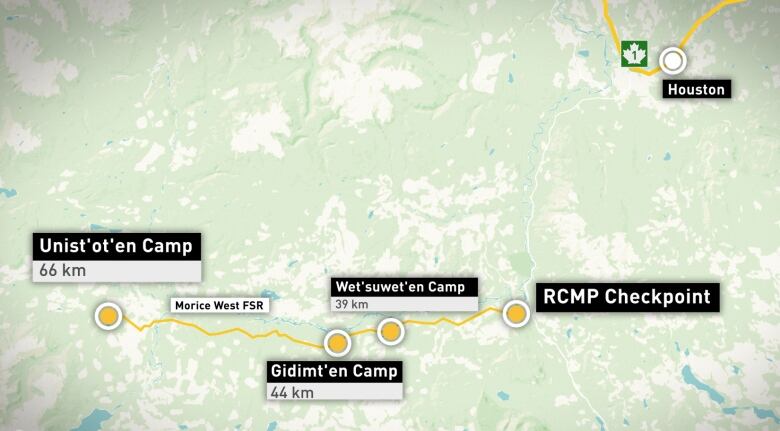RCMP dismantling fortified checkpoint in Wet'suwet'en territory

RCMP moved farther into the territory of the Wet’suwet’en First Nation on Friday, and started dismantling a fortified gate as a tense standoff continued with opponents of the Coastal GasLink pipeline who have defied a B.C. Supreme Court order to clear the way.
Videos from the scene show RCMP officers, in tactical gear, dismantling the fortified Gidimt’en checkpoint, which is located at the 44-kilometre mark of the Morice West Forest Service Road. Those encamped on the other side say they are asserting Wet’suwet’en law, at the direction of the nation’s hereditary chiefs.
Fifty-five vehicles — a mix of police and other vehicles — were seen moving into the exclusion zone on Thursday morning according to spokesperson and Gidimt’en clan member Molly Wickham, relaying messages she received from those at the checkpoint.
The people at the checkpoint are expected to be arrested, she said, speaking to reporters outside the exclusion zone on Thursday morning.
Wickham, who now carries the Wet’suwet’en name Sleydo’, was among those arrested at Gidimt’en on Jan. 7, 2019.
She said “it’s devastating for me to not be there while this is happening” but said she needed to stay away because she is currently seven months pregnant.
It’s unclear how many RCMP personnel are on the site.
On Thursday, the RCMP began its anticipated enforcement of the injunction after TC Energy was granted permission to construct the $6-billion, 670-kilometre natural gas pipeline from northeastern B.C. to the coast in Kitimat.
Six people were arrested early Thursday, with the RCMP announcing they were establishing an “exclusion zone” in the area.
The force said only police would be allowed to pass a specific point on the road while enforcement actions take place. RCMP said exceptions would be made for Wet’suwet’en hereditary chiefs and elected leaders at the discretion of a senior commander.
The RCMP said the individuals were arrested for obstruction. Officers also removed journalists from the area, drawing condemnation from groups like the Canadian Association of Journalists and the British Columbia Civil Liberties Association.
The RCMP said members of the media, along with others, “were transferred out for safety reasons, but not arrested.”
At least four of the six people who were arrested Thursday morning were back on the territory on Friday at a newly populated site at the 27-kilometre mark on the forest service road.
They told CBC News they were released, without charge, late Thursday night.
‘Feeling the pressure’
Thursday’s arrests happened five kilometres from the Gidimt’en checkpoint, and people living there are now waiting for the next wave of enforcement.
Eve Saint, daughter of Wet’suwet’en hereditary chief Woos, is among those at Gidimt’en checkpoint.
She said police have moved quickly through the territory.
By Thursday afternoon, after the early morning arrests nearby, people in the camp could hear heavy machinery getting closer to them.
“But we didn’t experience any breach as of yet so we’re kind of feeling the pressure tonight,” she said in an interview Thursday night.
Saint said the heavy machinery and RCMP made it within 100 metres of the checkpoint gate before stopping, then leaving.
By late Friday morning it was clear they were back and ready to continue enforcing the injunction.
Saint made clear the group is unarmed and intends to remain peaceful through whatever happens next. But she also plans to stand firm where she is.
She said for her, this is a fight for her land’s sovereignty and Indigenous rights.
“The hereditary chiefs had this governance system before Canada was even Canada,” she said.
She wants to protect that governance system, along with their connection to the land and water in the territory.
Enforcement draws outrage, disappointment
Initial enforcement actions on Thursday morning drew swift and widespread outrage from Indigenous leaders and First Nations across the country.
“We are in absolute outrage and a state of painful anguish as we witness the Wet’suwet’en people having their title and rights brutally trampled on and their right to self-determination denied,” Grand Chief Stewart Phillip with the Union of British Columbia Indian Chiefs said in the hours after the enforcement began.
There were also several solidarity demonstrations in urban centres.
Premier John Horgan spoke to reporters about the enforcement actions on Thursday, saying “certainly it’s not the outcome we had hoped for, or had been working toward.”
“We are continuing to be hopeful that there will be a peaceful resolution,” he said.
In an open letter posted on the Coastal GasLink website on Thursday, company president David Pfeiffer called the situation “disappointing.”
“This is not the outcome we wanted. We have made exceptional efforts to resolve this blockade through engagement and dialogue,” said Pfeiffer.
Wet’suwet’en hereditary chiefs spent much of Thursday on the forest service road while RCMP continued to move ahead in their enforcement actions.
N’amoks, one of the nation’s hereditary chiefs, was back on the forest service road early Friday morning.
In his view, the people who are standing in support of the nation on the territory “are doing the right thing at the right time for the right reasons. We’re protecting the land, the air, the water; our rights and title; our authority as hereditary chiefs. And we’re exercising our jurisdiction.”

While the hereditary chiefs assert their authority, the RCMP continue to assert theirs.
Given the isolated location of those in the Gidimt’en checkpoint, there is nowhere for the group to retreat to.
Beyond that checkpoint is the last of the Wet’suwet’en re-occupation sites on the road: the Unistot’en healing village. People from the nation have been operating a checkpoint at that site since 2009, asserting nobody is allowed through without the consent of the hereditary chiefs.





